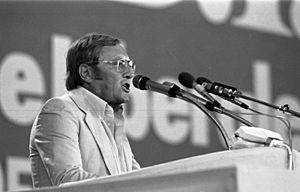Rudolf Augstein facts for kids
Quick facts for kids
Rudolf Augstein
|
|
|---|---|

Augstein at FDP-Bundesparteitag, 1980
|
|
| Member of the Bundestag for North Rhine-Westphalia |
|
| In office 19 November 1972 – 24 January 1973 |
|
| Preceded by | Wolfram Dorn |
| Succeeded by | Rolf Böger |
| Personal details | |
| Born |
Rudolf Karl Augstein
5 November 1923 Hannover, Weimar Republic (now Germany) |
| Died | 7 November 2002 (aged 79) Hamburg, Germany |
| Resting place | Sylt, Schleswig-Holstein |
| Political party | FDP |
| Spouses |
Lore Ostermann
(m. 1948; div. 1960)Katharina Luthardt
(m. 1960; div. 1968)Maria Carlsson
(m. 1968; div. 1970)Gisela Stelly
(m. 1972; div. 1992)Anna Maria Hürtgen
(m. 2000) |
| Children | 4 |
| Occupation | journalist, editor, publicist, politician |
Rudolf Karl Augstein (born November 5, 1923 – died November 7, 2002) was a very important German journalist, editor, and politician. He was known for being one of Germany's most influential journalists. He founded and partly owned Der Spiegel magazine. As a politician, he was a member of the Bundestag, which is the German parliament, for a short time. He represented the Free Democratic Party of Germany (FDP) from November 1972 to January 1973.
Contents
Rudolf Augstein: A Life in Journalism
Early Life and World War II
Rudolf Augstein was born in Hanover, Germany. During World War II, he served in the German Army. He worked as a radio operator and helped observe artillery. By the end of the war, he was a reserve officer.
Founding Der Spiegel
After the war, in 1946 and 1947, Augstein started Der Spiegel. This magazine quickly became, and still is, Germany's most important weekly magazine for investigative reporting. Investigative reporting means looking deeply into important issues to uncover facts.
Fighting for Press Freedom
Augstein played a key role in the Spiegel affair in 1961-62. This event was about the freedom of the press in Germany. He faced legal challenges related to his work. This situation led to strong public protests. It also caused some government officials to resign. This event showed how important it is for journalists to be able to report freely.
A Voice in Politics
In 1972, Augstein became a member of the West German parliament, the Bundestag. He represented the Free Democrats for North Rhine-Westphalia. However, he resigned just a year later. He wanted to focus more on his work as a journalist. Many people believed he felt he could make a bigger difference through his magazine than in politics.
Later Life and Legacy
Rudolf Augstein was also an amateur historian. He wrote several successful books. These included books about famous German historical figures like Preußens Friedrich und die Deutschen (1981) and Otto von Bismarck (1990).
As he got older, Augstein spent more time away from the daily running of Der Spiegel. However, he continued to write regular comments for the magazine almost until he passed away. In 2000, 101 German journalists honored him. They called him "Journalist of the century." This was for his lifelong work supporting peace, civil liberties, and freedom of the press. He was also recognized by the International Press Institute as one of the 50 World Press Freedom Hero laureates in 2000. This award highlighted his important role in the Spiegel affair.
Rudolf Augstein had four children. He passed away on November 7, 2002, from pneumonia. He was buried on the island of Sylt.
 | Georgia Louise Harris Brown |
 | Julian Abele |
 | Norma Merrick Sklarek |
 | William Sidney Pittman |

